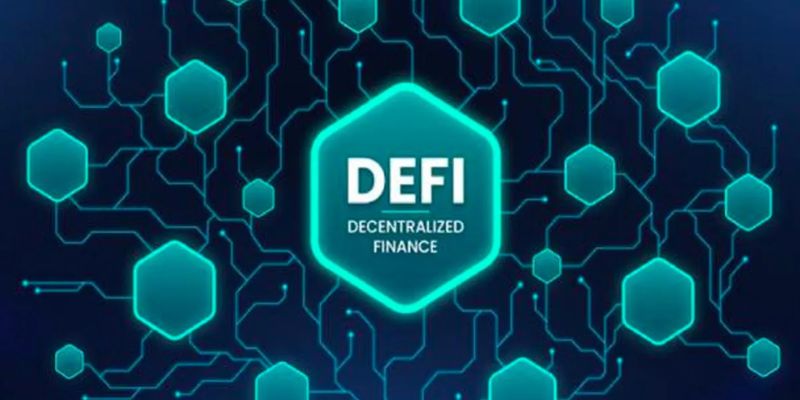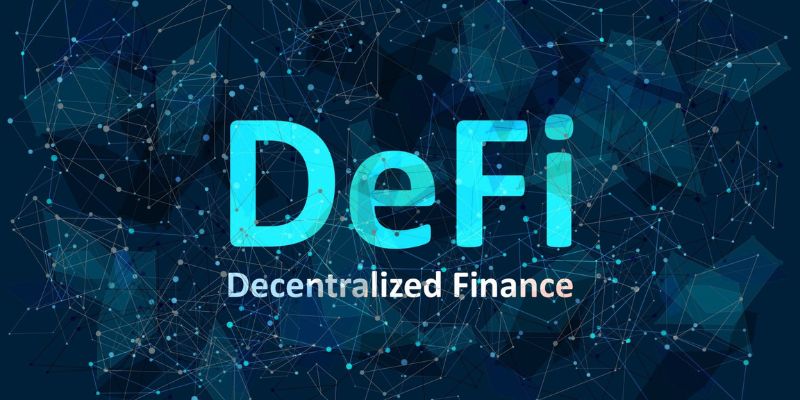You’ve heard the buzz about What is decentralized finance (DeFi)?—a term that’s shaking up the money game. It’s finance, but not as you know it: no banks, no suits, and no red tape. In essence, DeFi is finance democratized, built on high-tech ledgers called blockchains that make money moves transparent and fast. Here, you trade, borrow, and earn interest on your cash without anyone in the middle calling the shots. This isn’t just a niche trend for tech whizzes; it’s growing into a system that could offer everyone more control over their dough. So, let’s dig into this fresh financial world, explore how it stacks up against the old guard, and see why it might just matter to you.
Exploring the Core of Decentralized Finance (DeFi)
Defining DeFi and Its Revolutionary Approach to Finance
Did you ever wonder how money works online without a bank? That’s DeFi. DeFi means no banks, just people trading directly with people. It’s finance run by rules everyone can trust, set in code, not in a fancy building. Think of DeFi as a big game where everyone can see the rules. If you play, you control your money, not the bank.
The Building Blocks of DeFi: Smart Contracts and Blockchain Technology
Smart contracts are the heart of DeFi. Crypto is the blood. Both work together to make secure deals using blockchain, kind of like a digital contract book. This makes sure your money goes exactly where it should. No middle man means you save on fees too.
Now, let’s break it down some more. DeFi is like having a wallet that can move money or make deals by itself, following rules you agree with. A smart contract is an unbreakable promise that does what it says, every time, without fail. It moves your crypto where it needs to go based on what it’s told. With DeFi, you can lend your crypto and earn interest or borrow more by promising to pay back. It’s all built on blockchain, which you can think of as a big, safe, digital rock where no one can mess with your stuff.
And guess what? DeFi runs not just on one kind of crypto, but lots! It’s not picky. This includes stablecoins, which don’t jump around in value like some wild crypto. They stay calm, like a dollar. So, DeFi can help keep your money from going on a rollercoaster ride.
In DeFi, you can also farm yields! No, not like growing corn, but kind of. It means you lend out your crypto to others on DeFi, and they pay you for it. You get more crypto just by letting yours work for you. It’s sitting there anyway, right?
DeFi is not just about lending and farming. It also creates new ways to trade on decentralized exchanges, often called DEXs. This is like a farmer’s market for crypto where you swap one type for another.
One more cool thing in DeFi is governance tokens. These are like having a say in how the rules of the game change. If you hold them, you can vote on decisions that shape DeFi’s future.
So that’s DeFi in a nutshell. It’s taking power from old-school banks and giving it to you. You do need to watch out for risks though, but no need to worry. That’s what smart contracts are for. They help keep your DeFi moves safe.
Remember, with the freedom of DeFi comes responsibility. It’s powerful, and it’s got some learning curves, but it’s changing finance for good and for all of us. Now that’s something to get excited about! It’s truly people power—your money, your rules. Keep an eye on it, folks. DeFi is here to stay.
The Benefits and Risks of DeFi Participation
Advantages of DeFi over Traditional Banking Systems
Imagine a world without banks, where you control your money yourself. This is what decentralized finance offers. It lets you save, borrow, lend, and earn interest directly with others. No middlemen, no hidden fees.
DeFi runs on blockchain. It’s like a big, secure ledger that no one owns but everyone can use. The rules are clear and the same for all. Smart contracts power DeFi. Think of them as computer programs that run financial deals without mistakes or cheating.
We can use DeFi from anywhere, any time. It works around the clock, unlike banks that close. With DeFi, you can get higher interest rates than in a regular bank. You also have more choices on how to use your money. This helps people who can’t use banks join the financial world.
Navigating the Risks and Security Challenges in DeFi
But with great freedom comes risk. DeFi is still very new. Rules and safety nets that protect us in traditional banking are not always there in DeFi. Smart contracts are strong but not perfect. If there’s a bug, someone might steal your money, and you won’t get it back.
Some people also worry that because DeFi is open and built on tech, it’s hard to understand. It’s true, DeFi can seem complex. But step by step, we can learn and get better at it. Also, everyone’s working on making it safer. We have insurance policies in DeFi now, and people are creating tools to check for bugs in smart contracts.
We also must remember to be smart about security. Keep your passwords and keys safe. Be wise when choosing where to invest. Not all DeFi projects are good or safe. And there’s more work to do in dealing with government rules so that DeFi stays fair.
DeFi is all about making finance open for everyone. We love it because it offers freedom, choice, and good returns. But we should also know what we’re getting into, be ready for the risks, and learn how to keep our money safe.
DeFi Mechanisms Unpacked: Lending, Borrowing, and Yield Farming
How DeFi Lending and Borrowing Transforms Financial Accessibility
Imagine you need money for a new bike. Usually, you’d ask a bank. In DeFi, you skip the bank. Instead, you use software called DeFi protocols on the internet to lend or borrow. You deal directly with others. No middle person, no long waits.
Let’s say I put my money into a DeFi system. I earn interest, kind of like a bank’s savings account. But it’s not a bank. It’s a smart contract on the blockchain. You ask this system for a loan. You get the money if you show you can pay back.
This is huge. People all over can lend, borrow, and earn without a real bank. Not just rich folks, everyone. And the interest rates? They often shift based on supply and demand.
But don’t forget, risks exist. If the price drops a lot, you might have to pay more. This keeps your loan safe.
Now let’s peek under the hood. Smart contracts power this lending and borrowing. They make sure everything runs as agreed, and they’re stiff. Once made, they can’t bend the rules.
This way of lending and earning changes the game. It helps people find new chances to grow their money or get loans without big barriers.
The Concept of Yield Farming and Liquidity Provision in DeFi
Now, onto yield farming. Sounds cool right? It is! Think about regular farming. You plant seeds and grow crops. In DeFi, you plant cryptocurrencies into something called liquidity pools. They’re like shared pots of money on DeFi apps.
When you put your money there, you help others trade cryptocurrencies. It’s like you’re the bank. For this, you earn rewards. That’s yield farming. It’s how you grow more money from the money you have.
But why would DeFi apps need your money? They use it to let other folks trade or get loans. This is where decentralized exchanges (DEXs) come in. They are markets without a real person running the show. It’s all smart contracts and programs.
And there’s more. Some pools give out special coins called governance tokens. With these, you can vote on changes in the DeFi app. It’s like being a part of the app’s decision-making.
Yield farming can give good returns. But it can also change fast and holds risks. Prices can move quick, and your investment might lose value.
This might seem complex. But it’s just a new way for all to join in finance. Big or small, you can take part, help out, and maybe earn more.
Kids, we’re looking at how doing money could change forever. Isn’t that something? From swapping coins to being your own bank. It’s all about sharing finance for everyone. And it’s growing every day.
The Future Trajectory of DeFi: Adoption and Regulation
DeFi Market Growth and Its Impact on Financial Inclusion
Imagine a world where everyone can bank, with no need for a real bank. Sounds wild, right? That’s where DeFi, short for decentralized finance, comes into play. This is a game-changer for people left out by banks. DeFi lets anyone with a web connection join the financial world.
The DeFi market is blooming fast. Why does this matter? It allows financial inclusion growth. Think of it like this: with DeFi, someone far away with only a cell phone can save, borrow, earn interest, and more. All this, without ever walking into a bank.
Now, many folks who couldn’t get to banks can control their money on their terms. They can send cash to family and invest in new ways. DeFi has thrown open doors to financial activities that once seemed out of reach.
But it’s not just about banking. DeFi changes how we think of money itself. How you ask? It gives people chances to deal directly with one another. It reduces costs and wait times. For those without banks, DeFi’s role is huge. It means access to the global market. That’s big for places where banks scarce or not trusted.
So, Decentralized financial systems are growing. They make finance fair and open to all. This includes you and me, our neighbor Joe, and anyone who’s plugged into the web.
Navigating DeFi Regulations and the Importance of Compliance
Now, let’s put on our serious hats for a moment. DeFi isn’t just a free-for-all. We need rules to keep our money safe. This is where DeFi regulations come into the picture. These rules help keep bad actors out and protect users like you.
Understanding DeFi and its legal side is crucial. You see, every new thing goes through a “wild west” phase. There are few rules, and it can get risky. That’s where we’ve been with DeFi. But things are changing. Governments are getting smart about DeFi. They’re crafting policies to protect us while letting innovation thrive.
Staying on the right side of these rules is key. Non-custodial finance lets you be your own bank, but with that power comes responsibility. You have to know the risks and play it smart.
Blockchain technology in finance makes for exciting times. But let’s not forget, when money’s involved, being safe is better than being sorry. Knowing and following the DeFi rules keeps everyone’s money safe, and that’s what matters most.
Peer-to-peer DeFi transactions, smart contracts, and decentralized applications open new financial doors. And as we welcome these changes, we must also welcome the rules that help make them safe. Compliance isn’t just about dodging fines; it’s about trust. When DeFi is safe and trusted, it grows. And when it grows, we all win.
Understanding the ins and outs of smart contracts is fundamental to DeFi. They’re the backbone of every DeFi app out there. Just like regular contracts, we need them to be rock-solid. Strong smart contracts build strong DeFi systems.
So, that’s the scoop. DeFi regulation isn’t about stopping the party. It’s about making sure the party’s good for everyone – today and tomorrow.
In this post, we dug into DeFi—how it changes finance with smart contracts and blockchain. We saw DeFi’s perks, like beating old banks at their own game. But it’s not all sunshine. DeFi has risks we can’t ignore. We need to think about safety too.
We also looked at DeFi’s ins and outs. How does it make borrowing and lending easy for everyone? What about making money through yield farming? It’s pretty cool stuff. We can’t forget that DeFi keeps on growing. More people are getting in on it. This could be good for many. Yet, with growth comes big questions. How will rules shape DeFi’s path? We all have to wait and see.
To wrap up, DeFi’s exciting but complex. It’s full of chances and stumbling blocks. Staying smart and safe is key. Watch the road ahead—it’s going to be a wild ride. Keep learning, and keep your eyes open. That’s how we’ll make the most of DeFi’s promise. Let’s take on the financial future together!
Q&A :
What is Decentralized Finance (DeFi)?
Decentralized Finance, commonly referred to as DeFi, refers to the emerging financial technology that shifts traditional centralized banking and financial systems to peer-to-peer finance enabled by decentralized technologies built on blockchain networks. Essentially, DeFi platforms allow users to lend, borrow, trade, and make payments directly from their digital wallets without the need for conventional financial intermediaries.
How does DeFi differ from traditional finance?
Unlike traditional finance, which relies heavily on institutions like banks and regulatory bodies to function and safeguard operations, DeFi operates on a trustless and transparent framework provided by blockchain technology. In DeFi systems, smart contracts replace the role of these organizations, enabling more open access to financial services and fundamentally changing the relationship between parties involved in a financial transaction.
What are the benefits of using DeFi?
DeFi boasts a number of advantages over traditional finance. By leveraging blockchain technology, DeFi ensures high levels of security, transparency, and immutability. Additionally, it provides open access to financial services, especially for the unbanked or underbanked populations. DeFi often enables users to engage in financial transactions with greater autonomy and reduced fees, alongside yielding potentially higher returns on investments through novel mechanisms like yield farming and liquidity mining.
Are there any risks associated with DeFi?
While DeFi holds promise, it’s not without its risks. The nascent technology has issues around smart contract vulnerabilities, which can be exploited by hackers, leading to loss of funds. Price volatility in DeFi assets can be significant, and the relative lack of regulatory oversight brings about concerns regarding compliance and the potential for financial crimes. Moreover, the complexity of DeFi protocols may present a steep learning curve for new users, potentially resulting in costly mistakes.
Can DeFi replace traditional banks?
While it’s unlikely that DeFi will completely replace traditional banking in the near future due to regulatory, technological, and adoption hurdles, it is poised to significantly disrupt many aspects of the financial industry. DeFi offers alternatives for many financial services provided by banks, such as savings, loans, trading, and insurance, and it’s expected that both systems may eventually operate side by side or even integrate features from one another.





